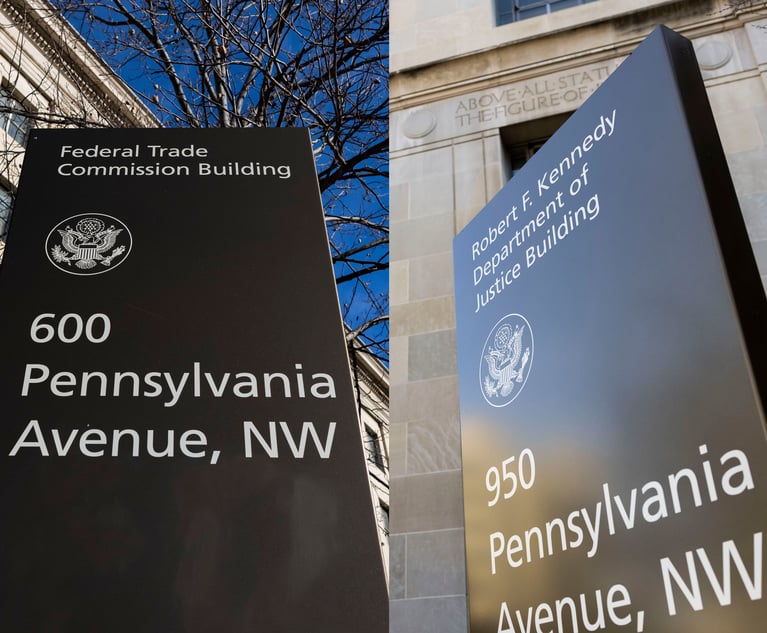Pearson's legal chief on the biggest challenges facing general counsel of global companies
Pearson GC Bjarne Tellmann on on building bridges and breaking silos
January 11, 2018 at 05:46 AM
6 minute read
The original version of this story was published on Law.com
 More than three years into the job, Pearson general counsel and chief legal officer Bjarne Tellmann has gained a deep understanding of the challenges involved in leading the legal department behind a global company.
More than three years into the job, Pearson general counsel and chief legal officer Bjarne Tellmann has gained a deep understanding of the challenges involved in leading the legal department behind a global company.
Some of his priorities are fairly common for department bosses, such as doing more with fewer resources and avoiding legal missteps. But leading a legal team of more than 150 professionals spread across six continents has also meant that Tellmann – who was last year named General Counsel of the Year at the British Legal Awards – has to focus on cultural sensitivity and breaking down the walls between lawyers in different geographic locations.
Tellmann, who joined the London-based company in 2014 and who works out of the company's New York office, spoke with Legal Week sister title Corporate Counsel about the complexities that come with working in an international company.
What are some of your top challenges as a global GC?
Bjarne Tellmann: There is, of course, the operational challenge of the 'more for less' demand. It is this constant need to sort of ensure an efficient frontier between cost, quality and speed. So, how do you manage to rapidly react to things in a cost-effective way and still provide consistent quality? That is top of my mind and when running a global department, it becomes ever more complex.
And then, depending on the different markets, we're facing a lot of the same risks that many large, multinational companies face, whether that's data privacy and making sure that we comply with those rules, or anti-bribery and corruption and making sure that we remain legally compliant with all the rules and regulations that we need to.
Intellectual property (IP) is also a big part of our practice, because we're a company that has moved from being more of a conventional publishing business to what is today very much a technology-led learning business. So we have moved from a world in which the primary focus was copyright to one in which patents and trademarks are very much front and centre of our practice.
Broadly speaking, how are you dealing with these challenges?
I think the key to success in any legal department is making sure that you get the right people on board. And in a world in which issues rarely stay put in one market and in a world in which our business spills across borders, one of the things that I look for in our talent is cultural intelligence. So, the ability to really understand how to navigate different cultures is way up there on my list of priorities when I look for people.
That's not just because lawyers might be sent to a particular location, it's because lawyers are increasingly managing other lawyers and paralegals and other professionals across borders. You may have someone sitting in Iowa managing a team of legal professionals in India, or you may have a Brazilian person managing a legal team of professionals in China. And in that world, it's really essential, both in leadership roles and on the teams, to understand how different cultures approach things.
[This is] because there are radical differences around the world in the way in which people in one market may approach, say, conflict and how to deal with it, or how hierarchies are [dealt] with. If you don't understand how lawyers attack things from their cultural mindset, you're not going to be able to manage them efficiently and effectively.
Communication and collaboration tools are essential in a multinational environment, as well. And I'm big on making sure that our leaders are actually out in the field. I don't think you can run a global department sitting from behind a desk in headquarters. I think you need to be out as much as possible, in the market meeting your partners, meeting your team and understanding the issues that they're facing. You will not have credibility when a crisis hits if you've only been there once and it was five years ago.
Focusing on IP, what are some of the ways you're addressing the difficulties of protecting IP in the global marketplace?
I think the approach to trademark protection, in particular, is one that is the most critical. There are variations in terms of how secure your trademark registrations are in different markets. And you face a lot of other issues, such as maturity of the courts. In some markets, you have the risk of corruption, as well.
Our answer is to have a central, cohesive strategy with which to tackle both trademark registration and trademark infringement. And so on the registration side, we have, over the last couple of years, centralised our trademark function. That has enabled us to formulate a much more cohesive brand architecture and a strategy behind that architecture in terms of which brands are priorities for us in which markets.
On the protection side, we've had the same approach, which is to centralise our enforcement efforts. And we have a very active and very vigorous enforcement protection group, that works on both the digital and print sides.
In a worldwide legal department, how do you prevent divisions in the team based on geographic location?
We're really focused on building bridges and breaking silos. I think silos are some of the most dangerous things you can have in any large organisation.
As a result, we've created a lot of global virtual networks that we use now to manage risks. So, for example, one of the things that we've done to break silos between the legal department and the compliance department, which reports into me, is create this virtual network of lawyers out in the field who are deputised as local compliance officers. And they're responsible for several things.
Number one is building the compliance culture where they are located. Number two is ensuring people in that market have access to someone on a confidential basis. We have hotlines and the like, but that's never a replacement for having someone in an office down the hall from you that you can just go to if you have a concern to talk to confidentially, behind a closed door. And then number three is assisting with investigations. So when the compliance team has an investigation, it's very helpful to be able to manage it with a local resource who understands how things are run there locally.
We've done the same thing with data privacy and with antitrust. So we're trying to break down those silos, especially when it comes to managing some of the areas where we have the biggest concerns in terms of legal risk.
This content has been archived. It is available through our partners, LexisNexis® and Bloomberg Law.
To view this content, please continue to their sites.
Not a Lexis Subscriber?
Subscribe Now
Not a Bloomberg Law Subscriber?
Subscribe Now
NOT FOR REPRINT
© 2024 ALM Global, LLC, All Rights Reserved. Request academic re-use from www.copyright.com. All other uses, submit a request to [email protected]. For more information visit Asset & Logo Licensing.
You Might Like
View All
Legal Departments Gripe About Outside Counsel but Rarely Talk to Them
4 minute read
‘Badge of Honor’: SEC Targets CyberKongz in Token Registration Dispute
3 minute read
FTC, DOJ Withdrawal of Antitrust Guidelines for Collaboration Infuriates Republicans
5 minute readTrending Stories
- 1Kirkland's Daniel Lavon-Krein: Staying Ahead of Private Equity Consolidation
- 2Many Southeast Law Firms Planned New, Smaller Offices in 2024
- 3On the Move and After Hours: Goldberg Segalla, Faegre Drinker, Pashman Stein
- 4Recent FTC Cases Against Auto Dealers Suggest Regulators Are Keeping Foot on Accelerator
- 5‘Not A Kindergarten Teacher’: Judge Blasts Keller Postman, Jenner & Block, in Mass Arb Dispute
Who Got The Work
Michael G. Bongiorno, Andrew Scott Dulberg and Elizabeth E. Driscoll from Wilmer Cutler Pickering Hale and Dorr have stepped in to represent Symbotic Inc., an A.I.-enabled technology platform that focuses on increasing supply chain efficiency, and other defendants in a pending shareholder derivative lawsuit. The case, filed Oct. 2 in Massachusetts District Court by the Brown Law Firm on behalf of Stephen Austen, accuses certain officers and directors of misleading investors in regard to Symbotic's potential for margin growth by failing to disclose that the company was not equipped to timely deploy its systems or manage expenses through project delays. The case, assigned to U.S. District Judge Nathaniel M. Gorton, is 1:24-cv-12522, Austen v. Cohen et al.
Who Got The Work
Edmund Polubinski and Marie Killmond of Davis Polk & Wardwell have entered appearances for data platform software development company MongoDB and other defendants in a pending shareholder derivative lawsuit. The action, filed Oct. 7 in New York Southern District Court by the Brown Law Firm, accuses the company's directors and/or officers of falsely expressing confidence in the company’s restructuring of its sales incentive plan and downplaying the severity of decreases in its upfront commitments. The case is 1:24-cv-07594, Roy v. Ittycheria et al.
Who Got The Work
Amy O. Bruchs and Kurt F. Ellison of Michael Best & Friedrich have entered appearances for Epic Systems Corp. in a pending employment discrimination lawsuit. The suit was filed Sept. 7 in Wisconsin Western District Court by Levine Eisberner LLC and Siri & Glimstad on behalf of a project manager who claims that he was wrongfully terminated after applying for a religious exemption to the defendant's COVID-19 vaccine mandate. The case, assigned to U.S. Magistrate Judge Anita Marie Boor, is 3:24-cv-00630, Secker, Nathan v. Epic Systems Corporation.
Who Got The Work
David X. Sullivan, Thomas J. Finn and Gregory A. Hall from McCarter & English have entered appearances for Sunrun Installation Services in a pending civil rights lawsuit. The complaint was filed Sept. 4 in Connecticut District Court by attorney Robert M. Berke on behalf of former employee George Edward Steins, who was arrested and charged with employing an unregistered home improvement salesperson. The complaint alleges that had Sunrun informed the Connecticut Department of Consumer Protection that the plaintiff's employment had ended in 2017 and that he no longer held Sunrun's home improvement contractor license, he would not have been hit with charges, which were dismissed in May 2024. The case, assigned to U.S. District Judge Jeffrey A. Meyer, is 3:24-cv-01423, Steins v. Sunrun, Inc. et al.
Who Got The Work
Greenberg Traurig shareholder Joshua L. Raskin has entered an appearance for boohoo.com UK Ltd. in a pending patent infringement lawsuit. The suit, filed Sept. 3 in Texas Eastern District Court by Rozier Hardt McDonough on behalf of Alto Dynamics, asserts five patents related to an online shopping platform. The case, assigned to U.S. District Judge Rodney Gilstrap, is 2:24-cv-00719, Alto Dynamics, LLC v. boohoo.com UK Limited.
Featured Firms
Law Offices of Gary Martin Hays & Associates, P.C.
(470) 294-1674
Law Offices of Mark E. Salomone
(857) 444-6468
Smith & Hassler
(713) 739-1250









